
APPLICABLE ALGEBRA IN ENGINEERING COMMUNICATION AND COMPUTING
Scope & Guideline
Advancing Applied Mathematics for Real-World Engineering
Introduction
Aims and Scopes
- Algebraic Coding Theory:
The journal extensively covers topics related to coding theory, including the construction, analysis, and optimization of various types of error-correcting codes, such as cyclic codes, BCH codes, and self-dual codes. - Finite Fields and Commutative Rings:
Research on algebraic structures over finite fields and commutative rings is a core focus, addressing aspects like polynomial factorization, code construction, and properties of algebraic objects. - Cryptography and Security:
The journal features papers that explore the use of algebraic techniques in cryptography, including the development of secure cryptographic protocols and analysis of their strength against attacks. - Graph Theory and Algebraic Combinatorics:
There is a significant interest in the application of algebraic methods to graph theory and combinatorial designs, particularly in relation to coding theory and information structures. - Mathematical Foundations and Algorithms:
The journal also emphasizes theoretical advancements and algorithmic approaches in algebra, including Grobner bases, polynomial identities, and the computational aspects of algebraic structures.
Trending and Emerging
- Advanced Cryptographic Techniques:
There is a growing trend in exploring advanced cryptographic methods, particularly those leveraging algebraic structures, which indicates a heightened interest in security and privacy in digital communications. - Algebraic Geometry Codes:
Emerging research on algebraic geometry codes showcases a shift towards utilizing geometric properties in code construction, which is gaining traction in coding theory applications. - Dynamic Systems and Algorithmic Approaches:
Papers focusing on dynamic systems, algorithmic developments, and computational methods are increasingly prevalent, reflecting a move towards practical applications of algebra in computational contexts. - Interdisciplinary Applications:
An emerging theme is the interdisciplinary application of algebraic techniques in fields such as bioinformatics, social networks, and data science, highlighting the versatility of algebra in solving real-world problems. - Graph-Based Coding Techniques:
There is an increasing interest in the application of graph theory to coding techniques, indicating a trend towards exploring the connections between algebraic structures and graph properties in coding theory.
Declining or Waning
- Elementary Algebraic Structures:
Research focusing on basic algebraic structures and their elementary applications seems to be declining, as more complex and applied topics gain dominance. - Traditional Number Theory Applications:
There has been a noticeable reduction in publications specifically addressing classical number theory in relation to algebraic applications, suggesting a shift towards more applied and computational methods. - Static Error-Correcting Code Analysis:
Papers that solely focus on static analyses of error-correcting codes without practical implications or computational approaches are becoming less frequent, indicating a trend towards more dynamic and application-oriented research. - Historical Perspectives in Algebra:
The journal has seen fewer papers that explore historical or foundational perspectives in algebra, as the focus shifts towards novel contributions and contemporary applications.
Similar Journals

JP Journal of Algebra Number Theory and Applications
Charting New Territories in Algebra and Number TheoryJP Journal of Algebra Number Theory and Applications is a distinguished publication within the field of mathematics, specifically focusing on algebra and number theory. Published by PUSHPA PUBLISHING HOUSE, this journal serves as a platform for researchers and professionals to disseminate their cutting-edge findings and innovative methodologies. With its ISSN 0972-5555, it caters to an audience eager to explore mathematical concepts and applications that impact various scientific domains. Although it operates on a subscription model, the journal's commitment to high-quality peer-reviewed content makes it a valuable resource for students and scholars alike. The journal offers an exclusive insight into the complex interplay between algebra and number theory, ensuring that it remains at the forefront of mathematical discourse despite its coverage discontinuation from Scopus. The absence of an H-Index and low rankings within Scopus underscore the challenges the journal faces in a competitive academic landscape; however, it continues to foster a community for the exchange of ideas and the advancement of knowledge in mathematics.

International Journal of Mathematics and Computer Science
Bridging Theory and Application in Mathematics and ComputingThe International Journal of Mathematics and Computer Science (ISSN: 1814-0424, E-ISSN: 1814-0432), published by Lebanese University, serves as a vital platform for disseminating innovative research and advancements in the fields of mathematics and computer science. With a compelling range of topics including Algebra, Applied Mathematics, Computational Mathematics, and Statistical Analysis, this journal caters to a broad audience of researchers, professionals, and students. Spanning the years from 2017 to 2025, it has established a presence in several key quartiles, including Q3 rankings in Applied Mathematics and Computational Mathematics, and a Q4 ranking in Algebra and Number Theory. While currently not an open-access journal, it provides valuable insights through its rigorous peer-reviewed process, enhancing its relevance in both theoretical and applied domains. Furthermore, its presence in Scopus rankings reflects its commitment to quality, making it an essential resource for anyone looking to explore the intersection of mathematics and computer science.
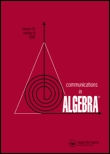
COMMUNICATIONS IN ALGEBRA
Shaping the Future of Algebraic Studies Worldwide.COMMUNICATIONS IN ALGEBRA is a prestigious academic journal dedicated to advancing the field of algebra and number theory. Published by Taylor & Francis Inc, this influential journal has been in circulation since its inception in 1974 and continues to provide a platform for innovative research through 2024. With an ISSN of 0092-7872 and an E-ISSN of 1532-4125, it serves a global community of researchers, professionals, and students who are passionate about algebraic studies. The journal is currently ranked in the Q2 category in Algebra and Number Theory for 2023, showcasing its strong impact and relevance within the academic community, as reflected in its Scopus rank of #60 out of 119 and a 50th percentile standing. COMMUNICATIONS IN ALGEBRA aims to publish high-quality, peer-reviewed research articles that not only address current issues in the field but also pave the way for future exploration, solidifying its role as a cornerstone of mathematical literature.

ARS Mathematica Contemporanea
Shaping Tomorrow’s Mathematical Landscape TodayARS Mathematica Contemporanea, published by UP FAMNIT in Slovenia, stands as a pivotal journal within the fields of algebra, number theory, discrete mathematics, geometric topology, and theoretical computer science. Since its inception in 2011, this journal has consistently provided a rich platform for innovative research, garnering a commendable Q2 category ranking in various mathematical domains, including Algebra and Number Theory, and Geometry and Topology, showcasing its growing influence and prestige in the academic community. With an increasing Scopus rank—particularly notable in Algebra and Number Theory at the 71st percentile—ARS Mathematica Contemporanea is dedicated to publishing high-quality, peer-reviewed content that advances the frontiers of mathematical knowledge. The journal’s commitment to open access ensures that valuable research is readily available to scholars, practitioners, and students alike, fostering collaboration and dissemination of ideas across the globe. As it converges towards its dedicated timeline extending to 2024, ARS Mathematica Contemporanea remains a crucial resource for those engaged in mathematical research, presenting an array of theoretical and practical insights that define contemporary mathematical discourse.
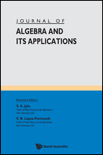
JOURNAL OF ALGEBRA AND ITS APPLICATIONS
Bridging the Gap Between Algebraic Theory and ApplicationJOURNAL OF ALGEBRA AND ITS APPLICATIONS, published by WORLD SCIENTIFIC PUBL CO PTE LTD, stands as a pivotal resource for scholars in the fields of Algebra and Applied Mathematics. With an ISSN of 0219-4988 and E-ISSN 1793-6829, this journal has been providing a forum for the dissemination of cutting-edge research since its inception in 2008, converging towards a forward-looking timeline extending to 2024. As of 2023, it has earned a commendable Q2 ranking in both Algebra and Number Theory, as well as Applied Mathematics, reflecting its solid impact within the mathematical community. With a Scopus rank of #49/119 in Algebra and Number Theory, and #420/635 in Applied Mathematics, the journal captures significant advancements and applications across various mathematical domains. While it does not operate under an open access model, its comprehensive articles and research outputs are crucial for fostering intellectual dialogue and innovation in academia. Researchers, professionals, and students alike will find this journal an indispensable asset for their scientific pursuits and explorations into the vast field of mathematics.
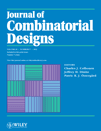
JOURNAL OF COMBINATORIAL DESIGNS
Unveiling Breakthroughs in Discrete MathematicsJOURNAL OF COMBINATORIAL DESIGNS, published by Wiley, is a leading peer-reviewed journal that serves as a vital platform for researchers in the field of discrete mathematics and combinatorics. With an impressive Q1 ranking in the 2023 category, it stands at the forefront of academic discourse, showcasing significant developments and innovative research from 1993 to 2024. The journal is dedicated to the study of combinatorial designs, including their applications in various scientific disciplines, which enhances its relevance among mathematicians and applied scientists alike. Although it operates on a traditional subscription model, the journal continues to attract high-quality submissions, as evidenced by its Scopus rank of #40 out of 92 in Discrete Mathematics and Combinatorics, placing it in the 57th percentile. Its commitment to advancing knowledge in combinatorial theory and applications makes it an essential resource for professionals, researchers, and students seeking to deepen their understanding and contribute to this dynamic field.
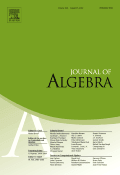
JOURNAL OF ALGEBRA
Unraveling Complex Algebraic ConceptsThe JOURNAL OF ALGEBRA, published by Academic Press Inc. Elsevier Science, is a premier scholarly outlet dedicated to the field of algebra and number theory. With its impressive Q1 ranking in the 2023 category of Algebra and Number Theory and a solid Scopus rank of #46 out of 119, it stands as a crucial resource for researchers and professionals seeking to deepen their understanding of advanced algebraic concepts. Operating since 1964 and continuing through 2025, the journal boasts a rich history of publishing influential research that drives the discipline forward. While the journal does not currently offer open access options, it remains committed to providing high-quality peer-reviewed content to the academic community. Its comprehensive archive and cutting-edge research articles serve as essential tools for students, researchers, and practitioners aiming to stay at the forefront of algebraic studies.

DISCRETE MATHEMATICS
Unraveling the complexities of mathematical structures.DISCRETE MATHEMATICS, published by Elsevier, is a leading journal dedicated to the field of discrete mathematics and combinatorics, with a distinguished presence in the academic community since its inception in 1971. With an ISSN of 0012-365X and an E-ISSN of 1872-681X, this esteemed journal has firmly established itself within the Q1 category for Discrete Mathematics and Combinatorics, and Q2 for Theoretical Computer Science as per the 2023 metrics, underscoring its pivotal role in advancing research in these vital areas. DISCRETE MATHEMATICS is highly regarded, reflected in its Scopus rankings, where it stands at #44 out of 92 in its primary category, contributing significantly to the global discourse on complex mathematical theories and applications. Published from the Netherlands, the journal serves as a crucial resource for researchers, professionals, and students looking to stay informed about the latest innovations and methodologies in discrete mathematics. Though currently not an open-access journal, DISCRETE MATHEMATICS continues to foster a vibrant scholarly community through rigorous peer-reviewed research, promoting a deeper understanding of the mathematical structures that underpin both theoretical and applied science.
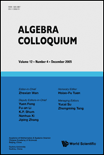
ALGEBRA COLLOQUIUM
Illuminating the Path of Mathematical DiscoveryALGEBRA COLLOQUIUM is a prominent journal dedicated to advancing the field of mathematics, specifically focusing on Algebra and Number Theory as well as Applied Mathematics. Published by World Scientific Publishing Co Pte Ltd, this journal is based in Singapore and has been a cornerstone in mathematical research since its inception in 1996, with an anticipated convergence through 2024. With an ISSN of 1005-3867 and E-ISSN of 0219-1733, it features rigorous peer-reviewed papers that cover a diverse range of topics within its scope. Reflecting its quality, Algebra Colloquium is ranked in the Q3 quartile in both Algebra and Number Theory as well as Applied Mathematics, indicating its significance amidst a competitive publication landscape. Researchers, professionals, and students looking to stay at the forefront of mathematical innovation will find a wealth of knowledge and research insights within these pages, making it an essential resource for anyone committed to deepening their understanding of algebraic concepts and techniques.

Problems of Information Transmission
Illuminating Innovations in Computer NetworksProblems of Information Transmission, an esteemed journal published by PLEIADES PUBLISHING INC, serves as a critical platform for scholarly discourse in the fields of computer networks, communications, computer science applications, and information systems. Established in 1972 and resuming publication from 2005 to 2024, this journal provides a rigorous peer-reviewed environment for researchers to present their findings, methodologies, and innovative applications. With a noteworthy impact factor and categorized as Q3 in several relevant fields in 2023, it ranks within the 30th percentile amongst its peers, indicating its established presence in the academic community. Although the journal is not open access, it remains an essential resource for professionals and students seeking to explore contemporary challenges and advancements in information transmission. For those pursuing knowledge in these dynamic areas, Problems of Information Transmission represents a significant and authoritative source of cutting-edge research and insights.